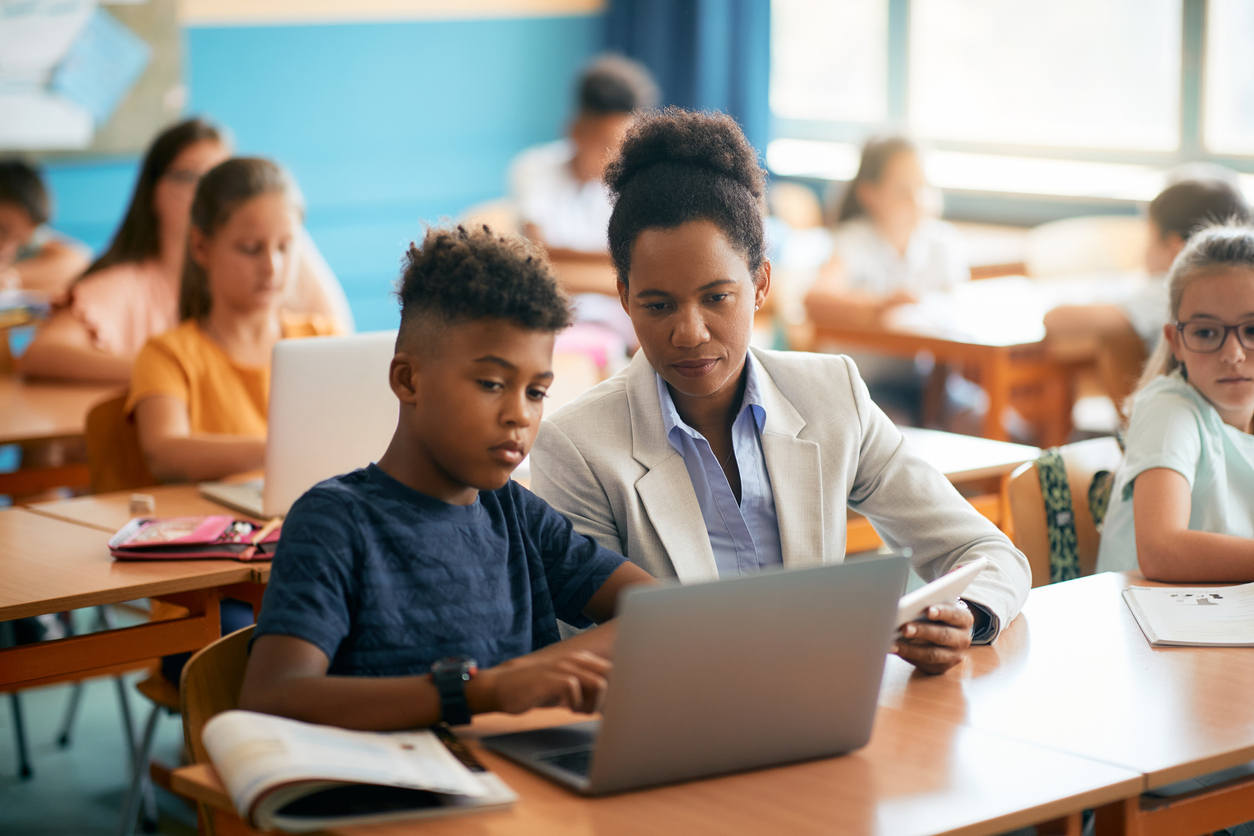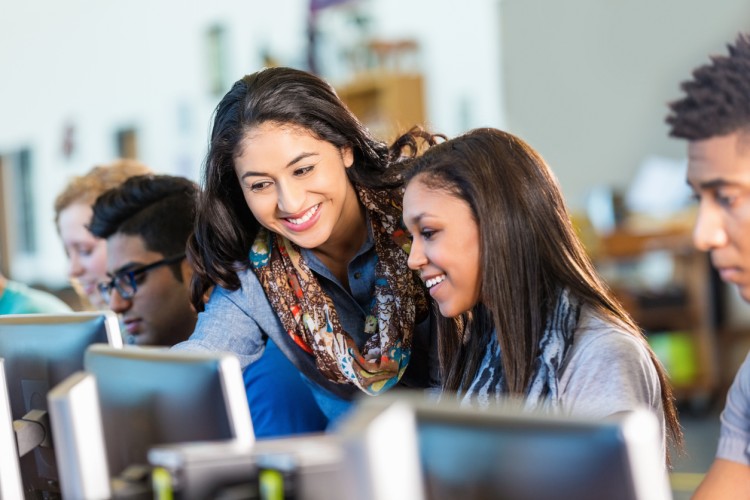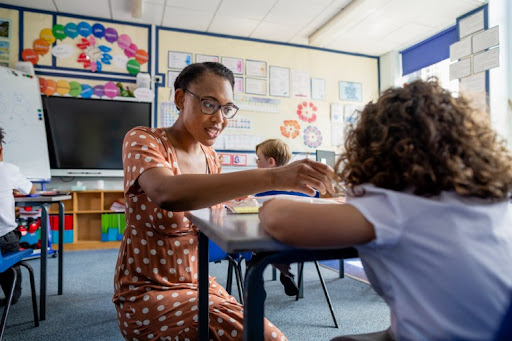The Future of Personalization in Learning
Written by:
Wilson College
• Jan 31, 2024

The practice of adapting lessons to students’ interests and abilities dates back more than a century, to the origins of widely accessible formalized education.
Today’s approach to learning personalization allows for greater customization, giving individual students a say in what they learn and the pace in which they learn it. This personalization aims to meet the needs of 21st century classrooms and careers, which feature greater diversity and require new types of knowledge and skills.
Personalization in learning is becoming more prevalent in the classroom. In fact, in 2023, eSchool News declared that personalized learning was one of the biggest educational trends of the year.
The future of personalization in learning will likely continue to evolve, as instructors work to address educational disparities and incorporate technological advances. Academic offerings for educators, including a master’s degree focused on customized learning , are helping today’s teachers meet these ever-changing demands.
Personalization in Learning: What Is It?
Personalization in learning tailors instruction to each student’s unique needs and abilities. Instead of taking a standardized approach that dictates how, what, and when all students learn, personalization allows each student’s own learning style and interests to guide instruction.
A student learning through personalized instruction may select the activities they want to do as part of an educational unit and determine the order in which they want to complete them. An educator may continually make note of a student’s individual strengths, needs, and goals, using that information to track and evaluate their progress and promptly adjust customized instructional plans as needed.
Characteristics common in a personalized learning approach include:
- Student collaboration—Groups and individual students share ideas, offer feedback, and solve problems.
- Lesson flexibility—Students have the autonomy to select the type of lessons they want to focus on and determine how quickly they progress through them.
- Small-group instruction—One-on-one or small-group classroom work, often called targeted instruction, allows for individualized assessments and customized approaches.
- Student goal-setting—Students establish their own learning goals and select activities they believe are best suited for helping them achieve those goals.
- Personalized feedback—Educators provide individualized feedback to students, noting their specific areas of strength and opportunities for growth.
4 Benefits of Learning Personalization
Learning personalization offers a variety of advantages, helping students successfully navigate their education and prepare for their future careers. Following are four key benefits that point to a bright future for personalization in learning.
1. Promotes Student Autonomy
Personalization allows each student to adapt their learning to their own unique strengths, weaknesses, interests, and learning styles. This autonomy to choose the learning path that fits their skills and preferences makes education more meaningful to students, and as a result, they are more likely to be motivated to learn the material.
2. Encourages Collaborative Learning
While personalization accommodates the abilities and interests of each individual student, it also encourages collaboration. From working with others who are on similar learning paths, to presenting knowledge to classmates, students typically have many opportunities to interact and learn from others.
3. Mitigates Testing Issues
Standardized tests can be problematic for students who are poor test-takers and for educators who feel compelled to focus on material specific to those exams. With a personalized approach, students often can select the assessment method that suits them best—whether it’s a test or a project. Teachers have the flexibility to adjust lessons according to their students’ needs.
4. Fosters Workplace Readiness
Just as the modern workplace increasingly celebrates individual differences, personalized learning recognizes that each student brings their own background, interests, and abilities to the educational process.
Personalization can also allow students to use technology that accommodates individualized learning paths, such as software supporting remote communication and lesson customization. These types of tools power many of the careers of the 21st century.
What Is the Future of Personalization?
As educators work to celebrate diversity, promote equity, and incorporate emerging technologies, a variety of changes are in store for the future of personalization.
Remote Learning Opportunities
Offering students the choice to learn remotely provides the flexibility that is a cornerstone of personalized instruction. Online education is moving toward becoming an option not only for students who select it as their preferred method of learning but also for those who use remote technologies for home-based projects.
Flexible Learning Spaces
Classrooms and other areas where students learn are shifting to accommodate personalized instruction. Tomorrow’s learning spaces will feature more components, such as flexible furniture and mobile digital devices, that are easy to adjust according to students’ individual preferences.
Student-Equity Efforts
Schools are embracing personalized learning as part of efforts to promote equitable outcomes for all students. Personalization recognizes that students’ experiences and talents vary, and it helps to level the playing field by allowing for a variety of learning paths that accommodate students’ differences.
Technology-Enabled Activities
Technology is taking an increasingly prominent role in instruction, offering options for personalizing the learning experience. Software and websites can allow students to select and complete lessons at their own pace, modifying those activities according to student performance.
Real-Time Teacher Feedback
Another feature of personalization’s future will be quicker feedback from educators. Many digital learning platforms are providing real-time reports on student assessments. Teachers can more closely track academic progress, adjust lesson plans, and share updates with students and their families.
Be Part of the Future of Personalization in Learning
If you’re an educator who wants to strengthen your skills in personalized instruction, explore the Wilson College Online Master of Mass Customized Learning degree program. The only program of its kind in the United States, the Master of Mass Customized Learning can teach you about the tools and techniques that facilitate individualized learning.
With strong faculty support, small class sizes, and flexible, online coursework, the Master of Mass Customized Learning allows teachers to pursue a high-quality advanced education while they manage their work and personal commitments.
Whether you want to increase your earning potential or pursue administrative roles, discover how Wilson College Online can help you achieve your career goals.
Recommended Readings
Mass Customized Learning: All You Need to Know
Tips for Building an Engaging Special Education Classroom
Why Earn a Personalized Learning Degree?
Sources:
D2L, “The Complete Guide to Personalized Learning”
EdTechnica, “Personalized Learning”
Education Elements, “Six Examples of What Personalized Learning Looks Like”
Education Elements, “The Research Behind Personalized Learning”
eLearning Industry, “How Do Emerging Technologies Help Shape Personalized Learning Experiences?”
eSchool News, “5 of the Biggest Education Trends in 2023”
MyEnglishPages.com, “Empowering Students: The Key to Personalized Learning”


